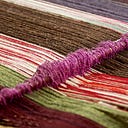How “Black Panther” Tackles the Political Erasure of Black Radical Women and 4 Ways You Can Too
“(We see) how much more effective a society can be if we allow women to explore their full potential.” — Lupita Nyong’o
If a rifle-wielding Black man in a beret is your go-to image of a Black Panther, you’re a victim of white revisionist history. Such patriarchal imagery not only pushes a white supremacist agenda, but also symbolizes the historical erasure of Black women’s political activism. In reality, Black women have been at the forefront of social revolution since before the Civil War.
Women made up almost two-thirds of the Black Panther Party (BPP) by the late 1960s. Predictably, the Panther’s bold assertion of their right to bear arms in the face of police brutality was a threat to white supremacy. In response, the U.S. government launched an aggressive campaign of surveillance, infiltration, incarceration, and state-sanctioned murder/assassination of male leaders. Panther women, such as Elaine Brown, stepped up as Chair of the BPP and occupied other key roles. They tackled sexism and misogynoir both inside and outside the Party by initiating gender equality efforts and creating vital community programs such as childcare, health screenings and clinics, and free school breakfasts.
Black women not only played critical roles in activist work, we led the fight for Black liberation. We STILL do. And that’s exactly what this weekend’s blockbuster hit Black Panther reminds audiences — Black radical women have always been in the trenches of anti-oppression struggles.
Directed by African-American and Oakland-born Ryan Coogler, Black Panther destroys the illusion of male-centered advocacy and counteracts the erasure of Black women from Pan-African movements. The women of Black Panther are not only central to the plot, but are the driving force behind the film’s exploration of Black liberation, redemption, and self-determination. And that’s what makes this movie “revolutionary as fuck.” The message is clear: Black women are the catalyst of our own political agency and just as much the heroes of our revolutionist histories.
In honor of Black History Month, here are 4 ways to reinforce and affirm Black female radical tradition both past and present.
1. DISCOVER MORE ABOUT THE WOMEN OF THE BLACK PANTHER PARTY.
- Check out this interview with Mary Phillips, one of the founders of the Intersectional Black Panther Party History Project.
- Read these pieces from Essence Magazine and For Harriet about the women who played vital roles in the Black Panther Party and the Black Power Movement.
- Watch Sister’s in the Struggle- Women of the Black Panther Party, a discussion among women who were members of the Black Panther Party (featuring Elise Brown, Barbara Easly Cox, Paula Peebles, Tasmen Sutton, Pam Hanna, Ife Sutton, and Claudia Williams).
- Host a screening and discussion of “The Black Panthers: Vanguard of the Revolution,” which is free here online and on Netflix for subscribers. View it by yourself — or better yet, gather a group together. After you view the documentary, talk about it! This discussion guide can help you structure your post-screening discussion.
2. SUPPORT POLITICAL PRISONERS AND THE ONGOING MOVEMENT FOR BLACK LIVES.
- Help free incarcerated members of the Black Panther Party. Read about the 16 BPP members still behind bars and share their support websites. Connect with and support BPP political prisoners by writing letters on behalf of the Jericho Movement using these suggestions.
- Order your copy of When They Call you a Terrorist here, a memoir written by Patrisse Khan-Cullors, Asha Bandele, with a forward by Angela Davis. This book chronicles the birth of the #BlackLivesMatter movement and the subsequent targeting of the three co-founders.
3. GET READY FOR BLACK PANTHER.
- Prep for the film by learning about the genres of Afro-futurism, Black comics, and Black fantasy and reading/watching/listening to the fabulous items on this list.
- Read this viewing guide by Intelligent Mischief, Mobilize the Immigrant Vote, and Movement Strategy Center before entering Wakanda.
- Check out the #BlackPantherChallenge video, launched by Frederick Joseph to buy movie tickets for Black children in Harlem, and follow the hashtag on Twitter.
- Look for a #WakandaTheVote team when in line for Black Panther. This project was initiated by the Electoral Justice Project and co-led by @iKaylaReed, @JessicaLBYRD and @RukiaLumumba.
4. GO SEE BLACK PANTHER AND HELP PURCHASE TICKETS FOR BLACK YOUTH.
Communities of color are fundraising to buy out entire theaters to see Black Panther — let’s keep the momentum going and crush box office records so that our youth (especially Black girls) can witness Black superheroes in action on the big screen. Representation matters. So, too, do the intersectional lessons in Black Panther.
- Support Black Panther by going to see the film in theaters.
- Fund tickets for Black youth. Join the #BlackPantherChallenge here or by going to this GoFundMe link to fund Black Panther tickets for Black children in your local community. Now that the Black Panther superhero is on the big screen, help ensure that Black children can see both him and the inspiring Black women of Wakanda — heroes, intellectuals, inventors, and leaders.
- Start your own local GoFundMe to give youth in your community the experience of Black Panther! Throw in extra for snacks.
This is the second action call in a series for this year’s Black History Month. You can financially support our work at https://www.buymeacoffee.com/solidaritywoc.
